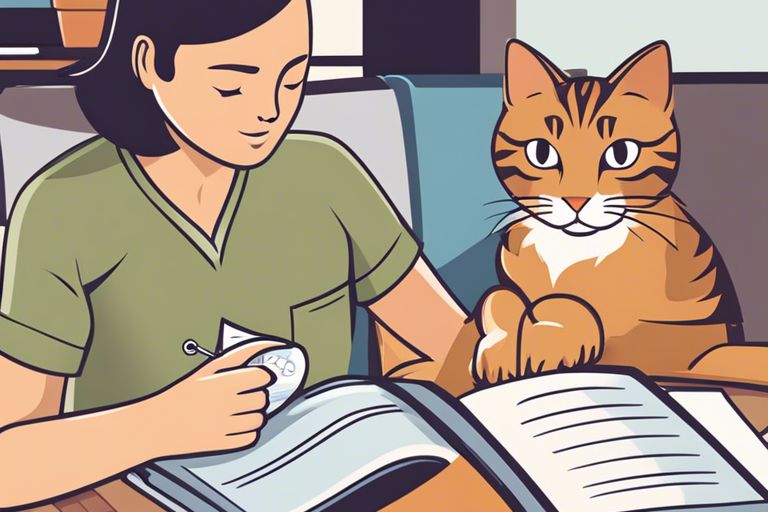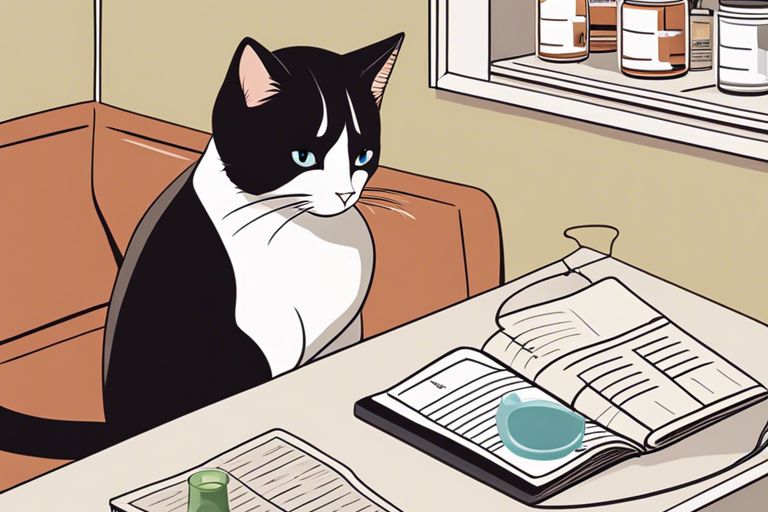As a cat owner, you are likely familiar with the occasional tummy troubles that your feline friend may experience. However, there are several common gastrointestinal problems that can affect your cat’s health and well-being. From hairballs and parasites to inflammatory bowel disease and food allergies, it is important to be aware of the potential issues that can arise. In this blog post, we will explore the most prevalent gastrointestinal problems in cats, including their symptoms and potential treatments, so that you can be better prepared to care for your cat’s digestive health.
Key Takeaways:
- 1. Hairballs: Hairballs are a common gastrointestinal issue in cats, often caused by grooming and ingesting fur.
- 2. Vomiting: Chronic or recurrent vomiting in cats can indicate a variety of gastrointestinal problems, such as gastritis or inflammatory bowel disease.
- 3. Diarrhea: Diarrhea in cats can be caused by dietary indiscretion, food allergies, parasites, or underlying health conditions.
- 4. Constipation: Constipation is another common gastrointestinal problem in cats, which can be caused by diet, dehydration, or health issues like megacolon.
- 5. Inflammatory Bowel Disease (IBD): IBD is a chronic condition that can affect a cat’s gastrointestinal tract, leading to symptoms like vomiting, diarrhea, and weight loss.
Identifying Gastrointestinal Problems
Clearly, identifying gastrointestinal problems in your cat can be a daunting task. However, being able to recognize the symptoms and knowing when to seek veterinary care can be crucial in maintaining your cat’s digestive health.
Recognizing Symptoms in Your Cat
When it comes to recognizing gastrointestinal problems in your cat, there are a few key symptoms to look out for. Vomiting, diarrhea, constipation, and loss of appetite are some of the most common signs that your cat may be experiencing digestive issues. If you notice any of these symptoms persisting for more than a day or two, it’s important to seek veterinary care to determine the underlying cause.
When to Seek Veterinary Care
If you notice any concerning symptoms in your cat, it’s important to seek veterinary care as soon as possible. Persistent vomiting, bloody diarrhea, lethargy, or a noticeable change in your cat’s behavior or appetite can all be signs of a serious gastrointestinal problem. Ignoring these warning signs can lead to further complications and potential harm to your cat’s health. Your veterinarian can help determine the cause of your cat’s digestive issues and recommend appropriate treatment to alleviate their discomfort and promote healing.
Common Gastrointestinal Disorders in Cats
Even though cats are known for their finicky eating habits, they can still experience a variety of gastrointestinal issues. It’s important to be aware of the most common gastrointestinal disorders in cats so that you can recognize the symptoms and seek proper treatment for your feline friend.
Hairballs
One of the most common gastrointestinal issues in cats is the formation of hairballs. When your cat grooms itself, it swallows loose hair, which can accumulate in the stomach and form a hairball. While occasional vomiting of hairballs is normal, frequent hairballs can cause blockages in the digestive system. To prevent hairballs, make sure you groom your cat regularly to remove loose hair, and speak to your veterinarian about hairball prevention products.
Inflammatory Bowel Disease (IBD)
Inflammatory Bowel Disease is a chronic condition characterized by inflammation of the gastrointestinal tract. It can cause symptoms such as diarrhea, vomiting, and weight loss. IBD is often managed through a combination of medication and diet modification. It’s important to work closely with your veterinarian to develop a management plan specific to your cat’s needs.
Intestinal Parasites
Intestinal parasites such as roundworms, hookworms, and tapeworms can cause gastrointestinal issues in cats. These parasites can be contracted through ingesting contaminated food, water, or from the environment. Regular deworming and maintaining good hygiene practices can help prevent intestinal parasitic infestations in your cat.
Infectious Gastroenteritis
Infectious gastroenteritis in cats is usually caused by viral or bacterial infections. Symptoms include vomiting, diarrhea, and dehydration. It’s important to seek veterinary care if your cat is showing signs of infectious gastroenteritis, as severe cases can be life-threatening. Treatment may involve supportive care and medication to address the underlying infection.
Constipation and Megacolon
Constipation occurs when a cat has difficulty passing stool, and in severe cases, it can lead to a condition called megacolon. This is characterized by an abnormally enlarged colon. If your cat is experiencing constipation, it’s essential to address the underlying cause, such as dietary issues or dehydration. Your veterinarian can provide guidance on managing constipation and preventing megacolon.

Treatment and Management
Unlike dogs, cats can be more challenging when it comes to administering medications or managing dietary changes. However, if your cat is diagnosed with a gastrointestinal problem, there are various treatment options and management strategies that can help improve their condition.
Dietary Considerations and Nutrition
One of the key aspects of managing gastrointestinal problems in cats is through their diet. Your veterinarian may recommend a special prescription diet that is highly digestible and gentle on the stomach. These diets are designed to provide all the necessary nutrients while being easy on the digestive system. Additionally, they may also suggest feeding smaller, more frequent meals to reduce the strain on the digestive tract.
Medications and Supplements
In some cases, your veterinarian may prescribe medications to alleviate symptoms such as vomiting, diarrhea, or stomach discomfort. These may include anti-nausea medications, probiotics to promote healthy gut flora, and antacids to reduce stomach acidity. It’s important to administer medications as directed by your veterinarian and never give your cat any over-the-counter medications without their guidance.
The Role of Surgery in Severe Cases
In severe cases of gastrointestinal problems, such as intestinal blockages or tumors, surgery may be necessary. Your veterinarian will discuss the potential need for surgery if they suspect a more serious underlying issue. Surgery can be a daunting prospect, but it can significantly improve your cat’s quality of life and overall health in certain cases.
Home Care and Long-term Management
Once your cat’s gastrointestinal problem is diagnosed and treated, it’s important to establish a long-term management plan. This may involve sticking to a specific diet, administering any prescribed medications or supplements, and monitoring your cat for any signs of recurring issues. Consistency and vigilance are key in ensuring your cat’s continued well-being.
Prevention and Early Detection
For more information on the most common gastrointestinal problems in cats, you can refer to the 7 Common GI Problems in Cats slideshow.
Diet and Lifestyle for Gastrointestinal Health
What you feed your cat plays a significant role in maintaining their gastrointestinal health. Choose a high-quality, easily digestible cat food and avoid sudden changes in their diet. Keeping your cat hydrated by providing fresh water at all times is essential for their digestive system. Additionally, regular exercise can help prevent obesity and minimize the risk of gastrointestinal problems.
Regular Veterinary Check-ups and Screening
Regular veterinary check-ups are crucial in detecting any gastrointestinal issues in your cat at an early stage. Your veterinarian can conduct blood tests, fecal examinations, and imaging studies to identify any potential problems. Early detection can lead to effective treatment and a better prognosis for your cat.
Conclusion: Common Gastrointestinal Problems in Cats
Hence, it is important to be aware of the most common gastrointestinal problems in cats so that you can recognize the symptoms and seek prompt veterinary care. From hairballs and dietary indiscretion to more serious conditions like inflammatory bowel disease and pancreatitis, cats can suffer from a range of digestive issues. By monitoring your cat’s behavior and seeking regular veterinary check-ups, you can help ensure that any gastrointestinal problems are detected and treated early, promoting your cat’s overall health and well-being.
FAQ
Q: What are the most common gastrointestinal problems in cats?
A: The most common gastrointestinal problems in cats include vomiting, diarrhea, constipation, and inflammatory bowel disease.
Q: What causes gastrointestinal problems in cats?
A: Gastrointestinal problems in cats can be caused by a variety of factors, including dietary indiscretion, hairballs, intestinal parasites, food allergies, bacterial or viral infections, and stress.
Q: When should I seek veterinary care for my cat’s gastrointestinal problems?
A: It is important to seek veterinary care if your cat is experiencing persistent vomiting or diarrhea, blood in the stool, abdominal pain, loss of appetite, weight loss, or any other concerning symptoms. These could indicate a serious underlying issue that requires prompt medical attention.

Jayley, a devoted cat enthusiast, also writer for other cat blog as well. She aims to dedicated to providing comprehensive information, insights, and advice on everything you’d ever want to know about our whiskered companions.
